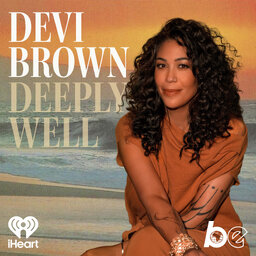The Color of Music with Goapele
In this episode, we delve into the colors and healing power of music with, Goapele, a versatile artist known for her roles as a singer, songwriter, producer, entrepreneur, and humanitarian. The conversation explores Goapele's background, including her South African apartheid and German Jewish ancestry, and how it has shaped her compassion for others. Goapele discusses her experience having synesthesia and how it influences her creative process, leading her to create multi-sensory experiences for her music.
Connect: @DeviBrown @Goapele
Learn More: Goapele.com / DreamSeeker.com
Subscribe: Devi Brown’s YouTube Channel
 Deeply Well with Devi Brown
Deeply Well with Devi Brown


